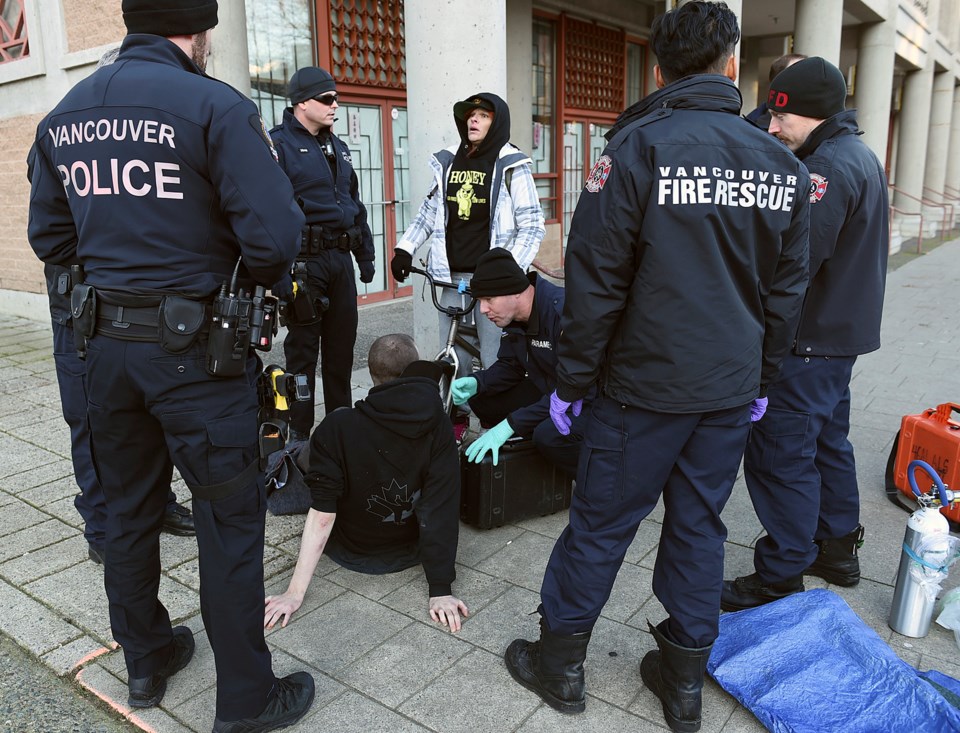The Vancouver Police Department is concerned criminal charges sought against fentanyl dealers will be delayed if the federal government doesn’t increase the capacity of Health Canada’s drug analysis service that police say is backlogged by the opioid crisis.
The department suggested in a report going before the Vancouver Police Board Thursday that Health Canada is swamped with requests for drug analysis from police conducting investigations related to the overdose drug death epidemic.
“More resources for Health Canada would expectantly result in quicker analysis of results and, therefore, enable a quicker charge approval process,” the report said. “An accelerated process would ultimately reduce public safety threats with fentanyl traffickers taken into custody sooner.”
In most police investigations, the analysis of all drugs seized as evidence is required for a charge to be approved by the Public Prosecution Service of Canada. Health Canada has drug analysis labs in Toronto, Montreal and Vancouver and receives more than 120,000 drug samples each year from law enforcement agencies.
Over the last two years, the police report said, Health Canada analyzed in excess of 2,000 additional exhibits that contained fentanyl. To be clear, Health Canada’s drug analysis service is separate from the toxicology work done by B.C.’s Provincial Toxicology Centre on victims of drug overdoses.
More than 1,400 people in B.C., including 358 in Vancouver, died last year of a suspected drug overdose. Hundreds more died across the country. Fentanyl, the deadly synthetic narcotic 50 to 100 times more powerful than morphine, was connected to 81 per cent of overdose deaths in the province.
The report does not say whether any cases in Vancouver involving fentanyl dealers collapsed because of delays in analysis of drugs. But the report warns that a 2016 Supreme Court of Canada case known as Regina vs. Jordan established maximum timelines for the conclusion of criminal court cases.
“If these timelines are unfulfilled, it is presumed that the delays are unreasonable, unless proven otherwise by Crown Counsel,” the report said of the Jordan case. “The R v. Jordan decision has led to Crown Counsel establishing charge approval guidelines where charges are not approved until substantial disclosure has been received. This disclosure includes drug analysis results from Health Canada.”
The report pointed out the federal government announced in April 2017 that $116 million would be provided to support research for national measures to respond to the opioid crisis. That funding included “increasing national lab testing capacity,” the report said.
“However, much of the $116 million in federal funding will be invested over five years and, given the magnitude of the opioid crisis, the VPD is concerned about potential delays and significant backlog at Health Canada,” the report said.
The Courier contacted the office of federal health minister, Ginette Petipas Taylor, for comment. A statement from Taylor’s ministry did not directly respond to concerns raised by the VPD over delays and a backlog.
The ministry acknowledged the increased funding and said it allowed the drug analysis service to “expand its analytical services and expertise to clients beyond law enforcement agencies and a greater capacity to respond to an increased demand for drug analysis services.”
In addition, the statement said, the funding allowed the service “to begin disseminating Drug Summary Reports, which provide an overview of trends in illegal drugs and emerging threats based on laboratory analysis of samples submitted by law enforcement agencies. It also allowed [the service] to provide timely drug alerts to law enforcement and provincial and territorial health authorities about emerging potent illegal drugs.”
The statement noted Health Canada’s drug analysis service responds to requests from municipal, provincial, territorial and federal police forces and institutions. The agency prioritizes requests “based on the needs” of law enforcement agencies.
“Typically, samples are analyzed on a ‘first in, first out’ basis and [the agency] has a 60-day service standard in returning the results to the submitting officers,” the statement continued. “In 2017, the average turnaround time for the 124,731 analyses performed was 44 days. However, law enforcement authorities can request a rush analysis in which [the agency] can provide results in two business days.”
The police board meets Thursday at the VPD’s Cambie Street precinct and is expected to approve a resolution from the VPD to call on the federal government to increase funding to Health Canada to speed up drug analysis. The resolution, if passed, would be forwarded to the Canadian Association of Police Governance.
At last month’s police board meeting, Insp. Bill Spearn of the VPD’s major crime section said police took more than eight kilograms of fentanyl off the street in recent investigations. The majority of fentanyl associated with the opioid crisis is produced in clandestine labs.



